( English version at the bottom of the page )
Alekseyev 150 , bombardier prototype russe tiré du livre " Early Soviet Jet Bombers " . Réalisation unique sur Simple Plane .
En 1948 , l'OKB-1 commença les travaux de conception d'un nouveau bombardier à réaction , désigné RB-2 .
Cette conception a évolué jusqu'à ce que l'utilisation d'une nouvelle désignation apparaisse , le N° «150» est né .
Le '150' a été entièrement construit avec une peau contrainte en alliage léger et en acier à haute résistance pour les pièces soumises à de fortes contraintes .
Les trains d'atterrissage principaux sont rétractables à l'arrière du fuselage , le train d'atterrissage principal pouvant s'agenouiller avant le décollage , ce
qui permet de décoller sur des pistes plus courtes . Je n'ai pas reproduis ce système sur mon modèle . Le système de commande du '150' était révolutionnaire à
l'époque avec des commandes de vol électriques , actionnant les gouvernes. Il s’agit de l’un des tout premiers aéronefs « fly by wire » ainsi que de l’un des tout premiers
jets avec un contrôle de vol entièrement motorisés , sans toutefois disposer des ordinateurs modernes . La cabine avant logeait le pilote , le copilote , l'opérateur radio
et le tireur dorsal étaient logés dans un grand cockpit ressemblant à une serre . Le navigateur dans le nez et le tireur de queue dans sa propre cabine pressurisée , assis
sur un siège éjectable orienté vers le bas . Les membres de l’équipage du compartiment avant étaient "censés" avoir un siège éjectable . le n° '150' était équipé des dernières
technologies radios , d'un radar de navigation , ainsi q'un radar d'attaque au sol logé dans un carénage sous le nez . Les essais en vol ont finalement commencé en
septembre 1952 . Ils ont toutefois progressé lentement en raison des conditions météorologiques et de la correction des défauts découverts au cours des essais .
Le dix-septième vol du 9 mai 1953 s’est avéré être le dernier , le pilote Yakov Vernikov a mal jugé l’atterrissage . l’appareil a explosé . les dommages on été importants
mais réparables , hélas le '150' n'a jamais été réparé . L'avion représenté est ne posséde aucun marquage . Il a reproduit d'aprés les quelques photos disponibles sur le
livre " Early Soviet Jet Bombers " . Sur les photos consultées , la tourelle de mitrailleuse derriere le cockpit existe , mais n'était pas armée , contrairement a la
tourelle de queue . Le ' 150-R' , variante de reconnaissance photographique tactique a été conçu au début de 1951 . Une maquette a été construite , mais aucun développement
n'a été réalisé .
Décollage a 200 Mph avec un cran de trim . Réglage du trim après décollage - Réacteur gauche : touche 1 .
- Réacteur gauche : touche 1 .
- Réacteur droite : touche 2 .
- Feux de navigation : touche 3 .
- Feux d'atterrissage : touche 4 .
- Aérofrein : touche : touche 5 + VTOL bas .
- Parachute : touche .
- Verrouillage train avant : touche 8 .
- Trim .
- Volet : touche VTOL
English version .
Alekseyev 150, Russian prototype bomber from the book "Early Soviet Jet Bombers". Unique realization on Simple Plane.
In 1948, the OKB-1 began the design work of a new jet bomber, designated RB-2.
This design evolved until the use of a new designation appeared, the No. "150" was born.
The '150' has been entirely constructed with a stressed alloy skin and high tensile steel for high stress parts.
The main landing gear is retractable to the rear of the fuselage, the main landing gear being able to kneel before take-off;
which allows you to take off on shorter runways. I did not reproduce this system on my model. The control system of the '150' was revolutionary to
the time with electric flight controls, operating the control surfaces. It is one of the very first "fly by wire" aircraft as well as one of the very first
throws with a fully motorized flight control, but without modern computers. The front cabin housed the pilot, the co-pilot, the radio operator
and the backpacker were housed in a large cockpit resembling a greenhouse. The navigator in the nose and the tail shooter in his own pressurized cabin, sitting
on an ejection seat facing down. The crew members of the front compartment were "supposed" to have an ejection seat. the '150' was equipped with the latest
radio technologies, a navigation radar, as well as a ground attack radar housed in a fairing under the nose. The flight tests finally started in
September 1952. However, they progressed slowly due to weather conditions and the correction of defects discovered during testing.
The seventeenth flight of May 9, 1953 proved to be the last, the pilot Yakov Vernikov misjudged the landing. the device exploded. the damage was important
but repairable, alas the '150' has never been repaired. The aircraft shown is not marked. He reproduced from the few photos available on the
book "Early Soviet Jet Bombers". In the photos consulted, the machine gun turret behind the cockpit exists, but was not armed, unlike the
turret tail. The '150-R' tactical photographic reconnaissance variant was designed in early 1951. A model was built, but no development
has not been realized.
Takeoff at 200 mph with a trim tab. Trim adjustment after take off - Left reactor: key 1.
- Left reactor: key 1.
- Reactor right: key 2.
- Navigation lights: key 3.
- Landing lights: key 4.
- Airbrake: key: 5 + VTOL key down.
- Parachute: touch.
- Front axle lock: button 8.
- Trim.
- Shutter: VTOL button
Specifications
Spotlights
- GrizzlitnCFSP 7.2 years ago
- ChiChiWerx 7.2 years ago
- Tang0five 7.2 years ago
- Hyattorama 7.2 years ago
General Characteristics
- Predecessor Myasishchev M50 Bounder Ver 2 Exposé a Monino
- Created On Windows
- Wingspan 55.6ft (16.9m)
- Length 53.3ft (16.2m)
- Height 14.9ft (4.5m)
- Empty Weight 31,301lbs (14,198kg)
- Loaded Weight 45,965lbs (20,849kg)
Performance
- Power/Weight Ratio 2.004
- Wing Loading 125.0lbs/ft2 (610.5kg/m2)
- Wing Area 367.6ft2 (34.2m2)
- Drag Points 11211
Parts
- Number of Parts 152
- Control Surfaces 5
- Performance Cost 875

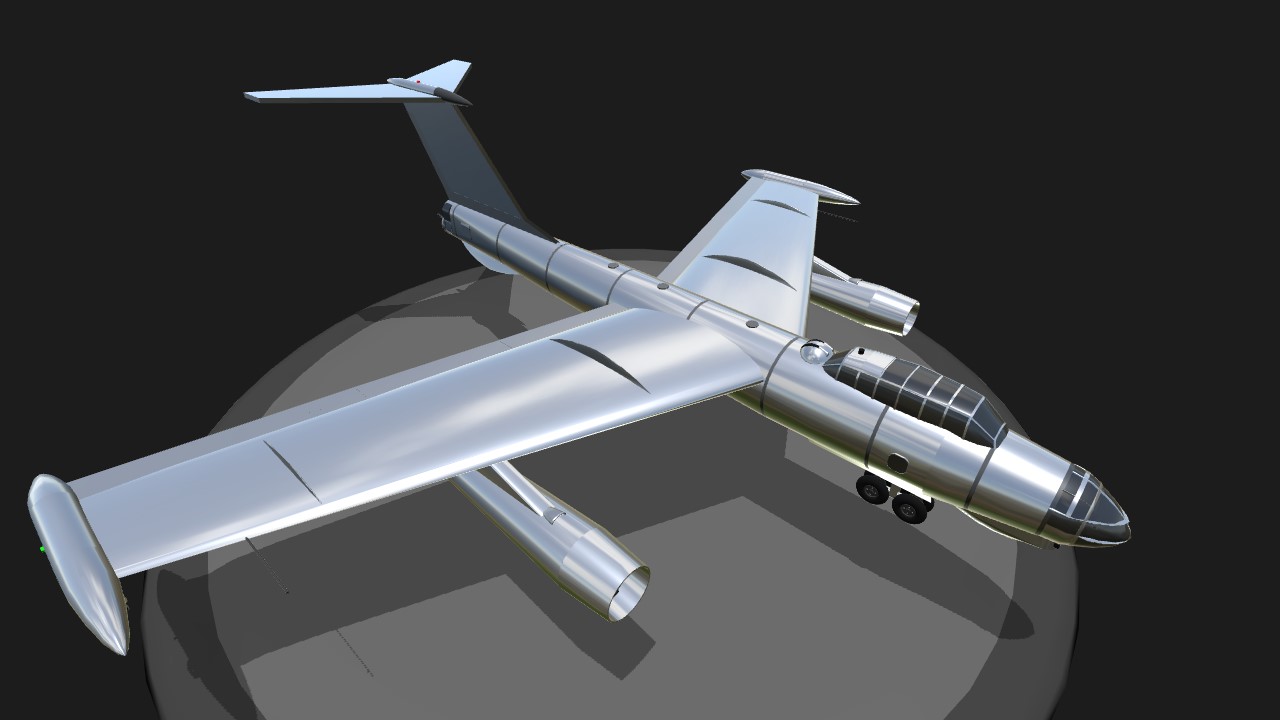
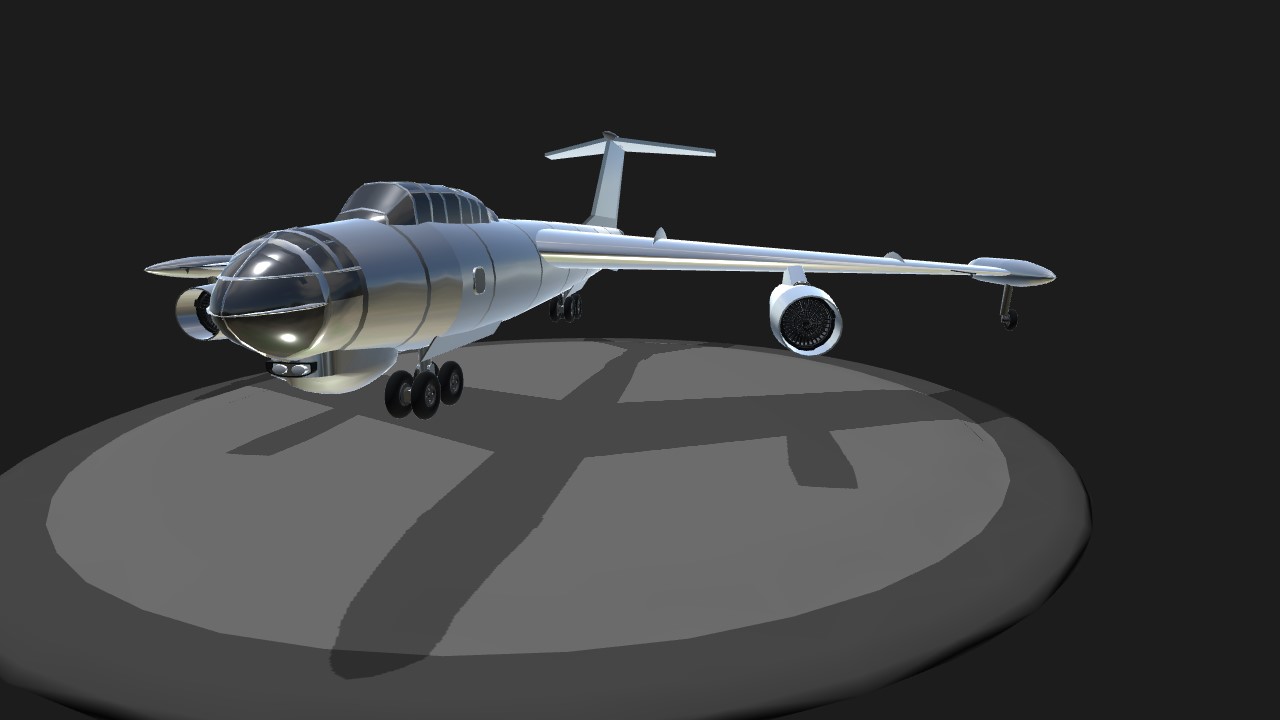
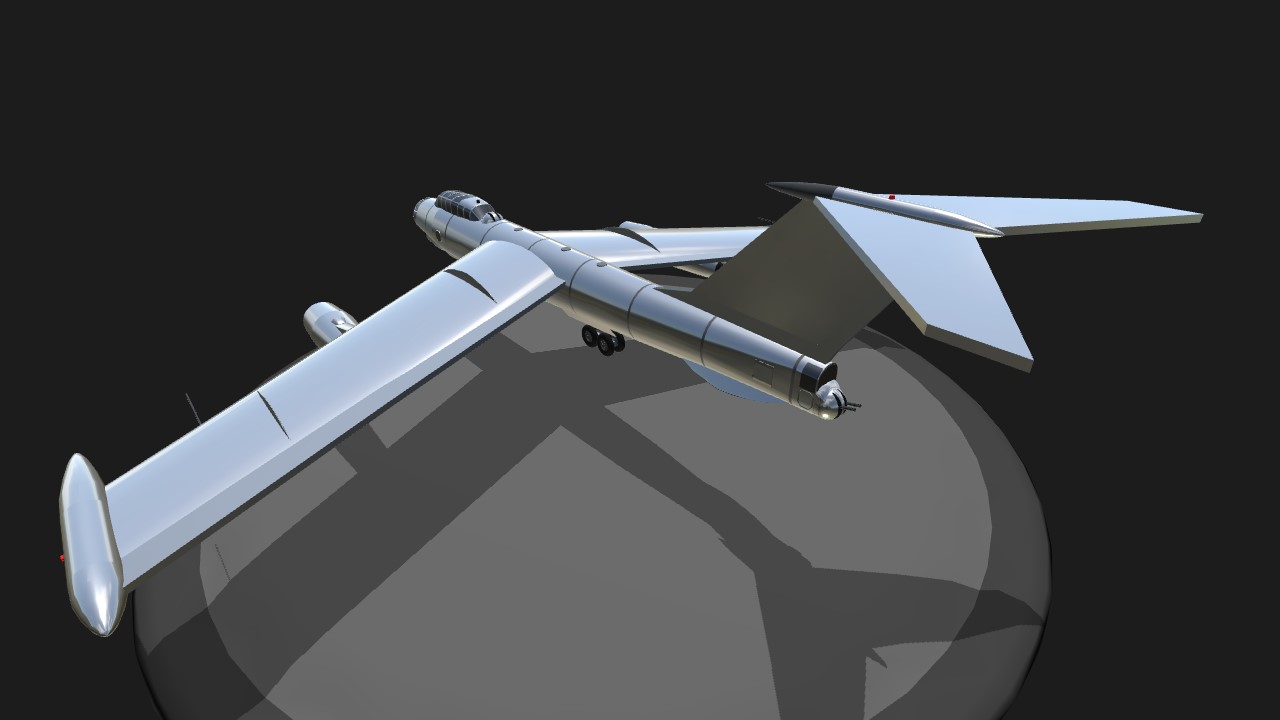
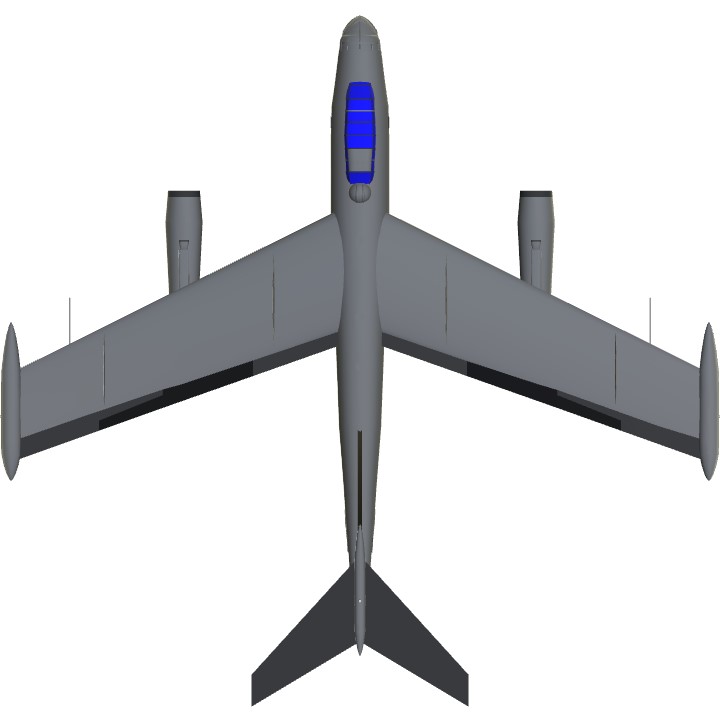
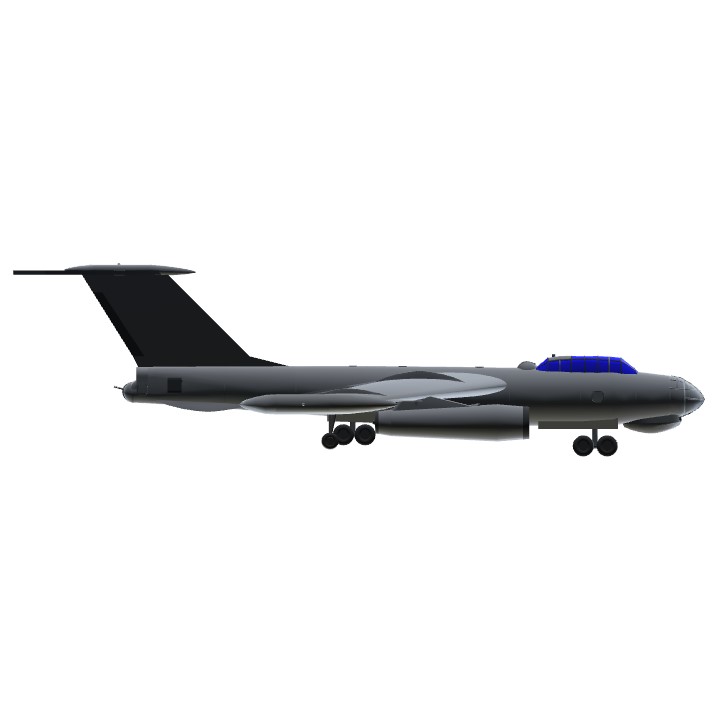
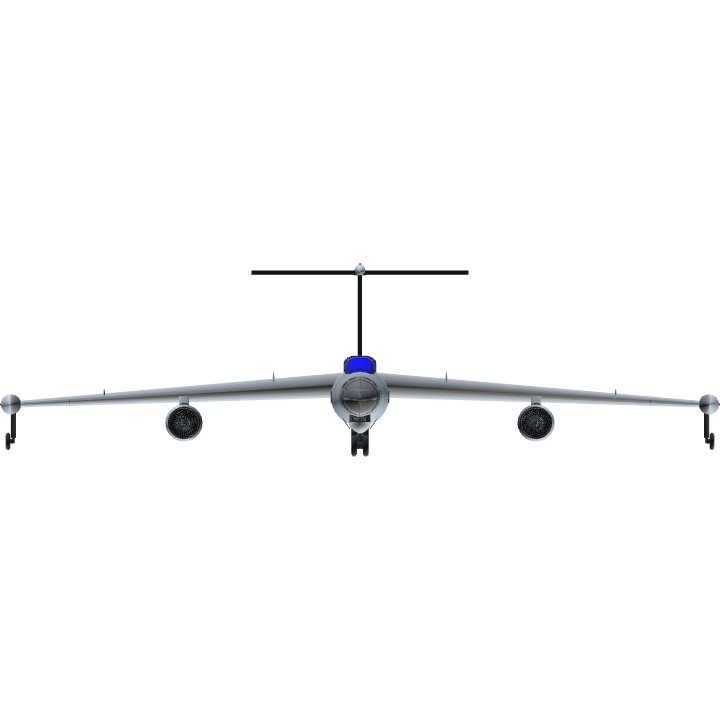
@XEPOH , Thanks for your upvote .
@ptrd , thank for your upvote .
@Trainzo
You are welcome!
@SakuraSaku , thank for you upvote .
@WarHawk95 , Thank for you upvote .
@Mustang51 , Thank you for your comment . Another is coming soon .
@BogdanX , @ACEPILOT109 , @Mustang51 , thanks all for yours upvotes .
Wonderful build! I look forward to seeing more ones like this
@Mumpsy , thank for you ypvote .
@LegnaK , thank for you upvote .
@ChiChiWerx , thank for have spotlighted my plane .
@DestinyAviation , thank for you upvote .
@RailfanEthan , @RailfanEthan , @ChiChiWerx , @DestinyAviation , thanks all for yours upvotes .
@AircraftoftheRedStar , thank for you upvote and you commentary .
Wow this is just spectacular!!
@Kerbango , thank for you upvote .
@mikoyanster , thank for you upvote .
@mikoyanster , thank for you upvote .
@Kingflyer1 , thank for you upvote .
@Hyattorama , thank for have spotlighted my plane .
@Hyattorama , thank for you upvote , and you comentary .
@Tang0five , tank you for you comentary and for have spotlighted my plane .
Wow, really awesome plane, I love it!!!
No problem buddy, I was just taking her for a spin and I was going to comment! Great job once more! @Trainzo
@Tang0five , thank for you upvote .